The Cambridge History of China. Vol. 12: Republican China, 1912-1949, Part 1
Подождите немного. Документ загружается.

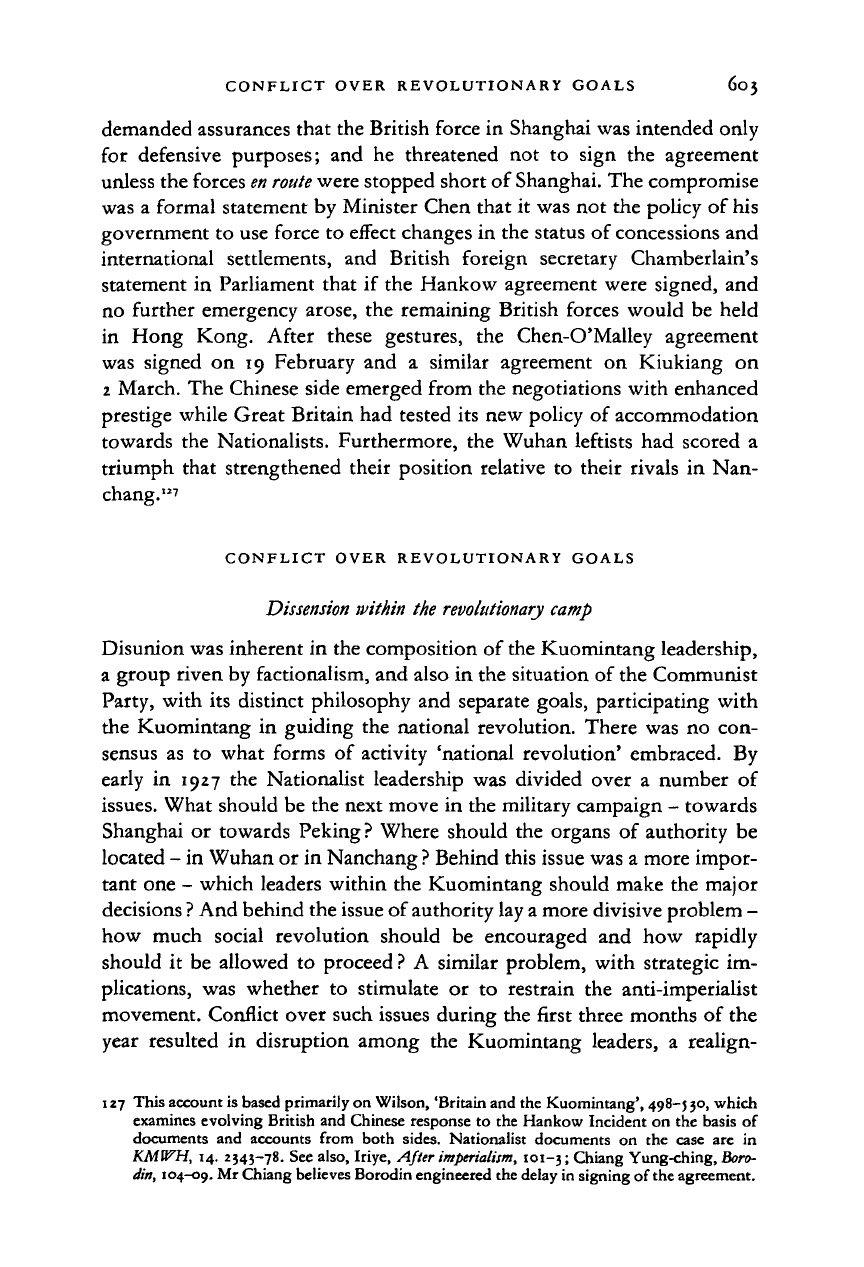
CONFLICT OVER REVOLUTIONARY GOALS 603
demanded assurances that the British force in Shanghai was intended only
for defensive purposes; and he threatened not to sign the agreement
unless the forces
en route
were stopped short of
Shanghai.
The compromise
was a formal statement by Minister Chen that it was not the policy of his
government to use force to effect changes in the status of concessions and
international settlements, and British foreign secretary Chamberlain's
statement in Parliament that if the Hankow agreement were signed, and
no further emergency arose, the remaining British forces would be held
in Hong Kong. After these gestures, the Chen-O'Malley agreement
was signed on 19 February and a similar agreement on Kiukiang on
2 March. The Chinese side emerged from the negotiations with enhanced
prestige while Great Britain had tested its new policy of accommodation
towards the Nationalists. Furthermore, the Wuhan leftists had scored a
triumph that strengthened their position relative to their rivals in Nan-
chang.
127
CONFLICT OVER REVOLUTIONARY GOALS
Dissension
within the
revolutionary
camp
Disunion was inherent in the composition of the Kuomintang leadership,
a group riven by factionalism, and also in the situation of the Communist
Party, with its distinct philosophy and separate goals, participating with
the Kuomintang in guiding the national revolution. There was no con-
sensus as to what forms of activity 'national revolution' embraced. By
early in 1927 the Nationalist leadership was divided over a number of
issues. What should be the next move in the military campaign - towards
Shanghai or towards Peking
?
Where should the organs of authority be
located - in Wuhan or in Nanchang
?
Behind this issue was a more impor-
tant one - which leaders within the Kuomintang should make the major
decisions
?
And behind the issue of authority lay a more divisive problem -
how much social revolution should be encouraged and how rapidly
should it be allowed to proceed
?
A similar problem, with strategic im-
plications, was whether to stimulate or to restrain the anti-imperialist
movement. Conflict over such issues during the first three months of the
year resulted in disruption among the Kuomintang leaders, a realign-
127 This account is based primarily on Wilson, 'Britain and the Kuomintang', 498-530, which
examines evolving British and Chinese response to the Hankow Incident on the basis of
documents and accounts from both sides. Nationalist documents on the case are in
KMWH,
14. 2343-78. See also, Iriye, After
imperialism,
101-3; Chiang Yung-ching,
Boro-
din,
104-09. Mr Chiang believes Borodin engineered the delay in signing of the agreement.
Cambridge Histories Online © Cambridge University Press, 2008
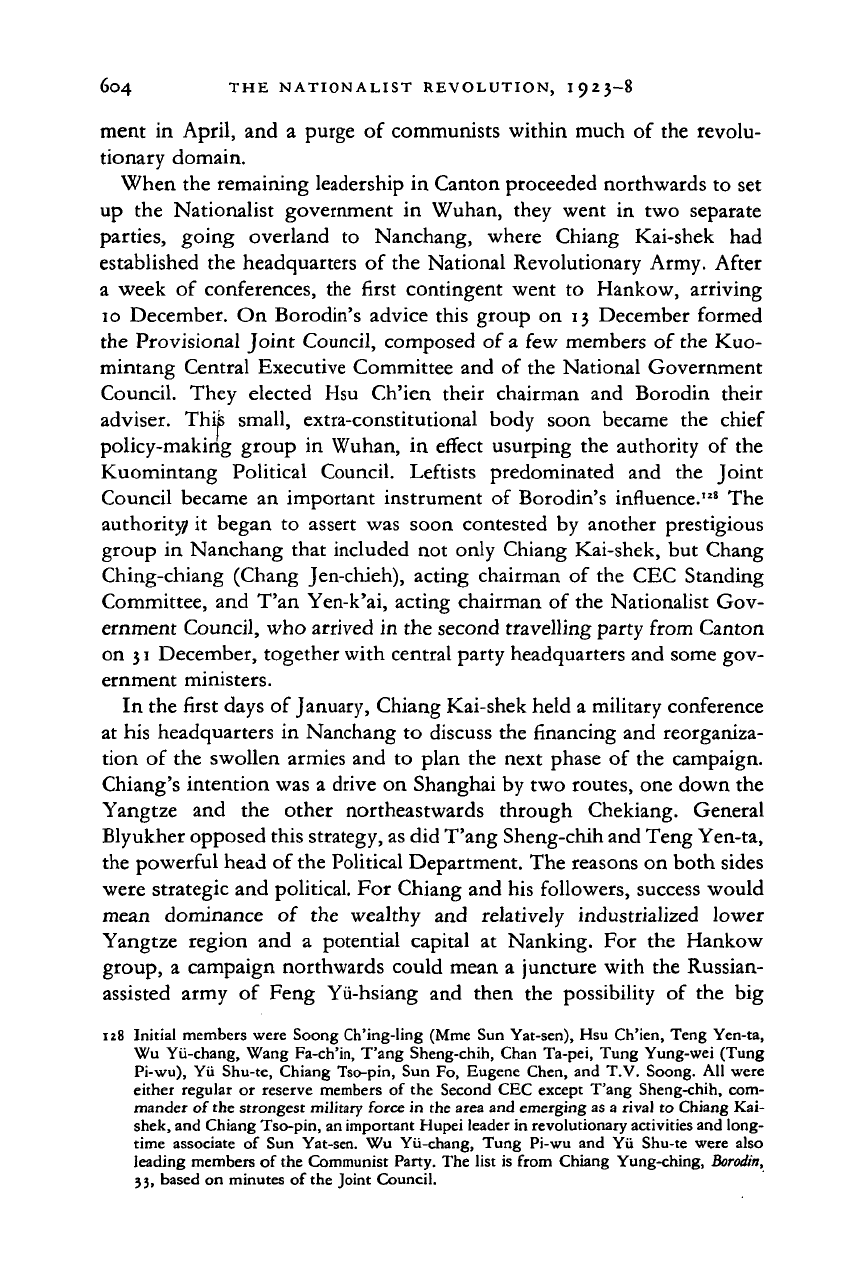
604 THE NATIONALIST REVOLUTION, I 9
2
3-8
ment
in
April,
and a
purge
of
communists within much
of the
revolu-
tionary domain.
When
the
remaining leadership
in
Canton proceeded northwards
to set
up
the
Nationalist government
in
Wuhan, they went
in two
separate
parties, going overland
to
Nanchang, where Chiang Kai-shek
had
established
the
headquarters
of the
National Revolutionary Army. After
a week
of
conferences,
the
first contingent went
to
Hankow, arriving
10 December.
On
Borodin's advice this group
on 13
December formed
the Provisional Joint Council, composed
of a few
members
of
the Kuo-
mintang Central Executive Committee
and of
the National Government
Council. They elected
Hsu
Ch'ien their chairman
and
Borodin their
adviser. Thife small, extra-constitutional body soon became
the
chief
policy-making group
in
Wuhan,
in
effect usurping
the
authority
of the
Kuomintang Political Council. Leftists predominated
and the
Joint
Council became
an
important instrument
of
Borodin's influence.
128
The
authority
it
began
to
assert
was
soon contested
by
another prestigious
group
in
Nanchang that included
not
only Chiang Kai-shek,
but
Chang
Ching-chiang (Chang Jen-chieh), acting chairman
of the CEC
Standing
Committee,
and T'an
Yen-k'ai, acting chairman
of
the Nationalist
Gov-
ernment Council, who arrived
in
the second travelling party from Canton
on 31 December, together with central party headquarters
and
some gov-
ernment ministers.
In
the
first days
of
January, Chiang Kai-shek held
a
military conference
at
his
headquarters
in
Nanchang
to
discuss
the
financing
and
reorganiza-
tion
of the
swollen armies
and to
plan
the
next phase
of the
campaign.
Chiang's intention was
a
drive
on
Shanghai
by two
routes,
one
down
the
Yangtze
and the
other northeastwards through Chekiang. General
Blyukher opposed this strategy, as did T'ang Sheng-chih and Teng Yen-ta,
the powerful head
of
the Political Department.
The
reasons
on
both sides
were strategic
and
political.
For
Chiang
and his
followers, success would
mean dominance
of the
wealthy
and
relatively industrialized lower
Yangtze region
and a
potential capital
at
Nanking.
For the
Hankow
group,
a
campaign northwards could mean
a
juncture with
the
Russian-
assisted army
of
Feng Yii-hsiang
and
then
the
possibility
of the big
128 Initial members were Soong Ch'ing-ling (Mme
Sun
Yat-sen),
Hsu
Ch'ien, Teng Yen-ta,
Wu Yu-chang, Wang Fa-ch'in, T'ang Sheng-chih, Chan Ta-pei, Tung Yung-wei (Tung
Pi-wu),
Yii
Shu-te, Chiang Tso-pin,
Sun Fo,
Eugene Chen,
and T.V.
Soong.
All
were
either regular
or
reserve members
of the
Second CEC except T'ang Sheng-chih,
com-
mander
of
the strongest military force
in
the area and emerging as
a
rival
to
Chiang Kai-
shek, and Chiang Tso-pin, an important Hupei leader in revolutionary activities and long-
time associate
of Sun
Yat-sen.
Wu
Yu-chang, Tung Pi-wu
and Yii
Shu-te were also
leading members
of
the Communist Party.
The
list is from Chiang Yung-ching,
Borodin,
33,
based
on
minutes
of
the Joint Council.
Cambridge Histories Online © Cambridge University Press, 2008
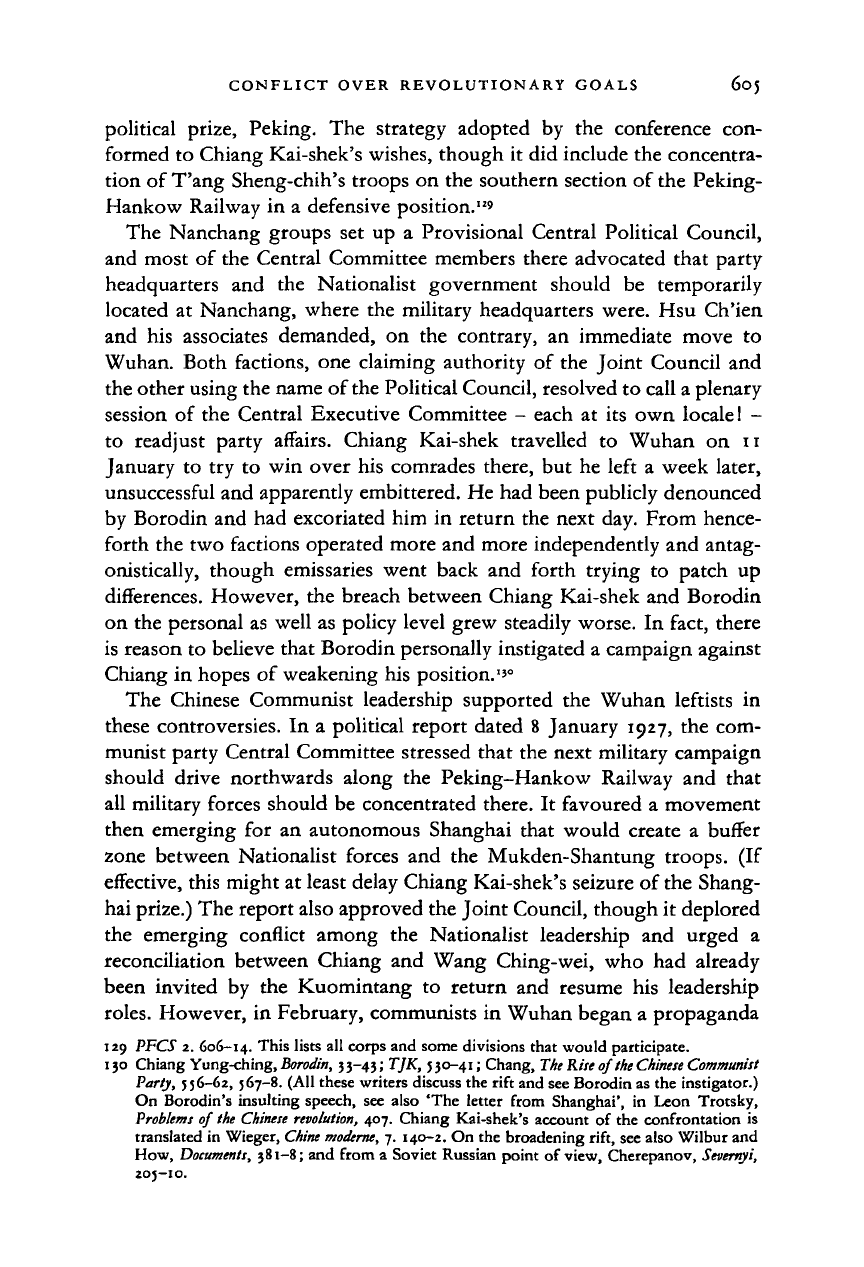
CONFLICT OVER REVOLUTIONARY GOALS 605
political prize, Peking. The strategy adopted by the conference con-
formed to Chiang Kai-shek's wishes, though it did include the concentra-
tion of T'ang Sheng-chih's troops on the southern section of the Peking-
Hankow Railway in a defensive position.
129
The Nanchang groups set up a Provisional Central Political Council,
and most of the Central Committee members there advocated that party
headquarters and the Nationalist government should be temporarily
located at Nanchang, where the military headquarters were. Hsu Ch'ien
and his associates demanded, on the contrary, an immediate move to
Wuhan. Both factions, one claiming authority of the Joint Council and
the other using the name of
the
Political Council, resolved to call a plenary
session of the Central Executive Committee - each at its own locale! -
to readjust party affairs. Chiang Kai-shek travelled to Wuhan on n
January to try to win over his comrades there, but he left a week later,
unsuccessful and apparently embittered. He had been publicly denounced
by Borodin and had excoriated him in return the next day. From hence-
forth the two factions operated more and more independently and antag-
onistically, though emissaries went back and forth trying to patch up
differences. However, the breach between Chiang Kai-shek and Borodin
on the personal as well as policy level grew steadily worse. In fact, there
is reason to believe that Borodin personally instigated a campaign against
Chiang in hopes of weakening his position.
1
'
0
The Chinese Communist leadership supported the Wuhan leftists in
these controversies. In a political report dated 8 January 1927, the com-
munist party Central Committee stressed that the next military campaign
should drive northwards along the Peking-Hankow Railway and that
all military forces should be concentrated there. It favoured a movement
then emerging for an autonomous Shanghai that would create a buffer
zone between Nationalist forces and the Mukden-Shantung troops. (If
effective, this might at least delay Chiang Kai-shek's seizure of the Shang-
hai prize.) The report also approved the Joint Council, though it deplored
the emerging conflict among the Nationalist leadership and urged a
reconciliation between Chiang and Wang Ching-wei, who had already
been invited by the Kuomintang to return and resume his leadership
roles.
However, in February, communists in Wuhan began a propaganda
129 PFCS 2. 606-14. This lists all corps and some divisions that would participate.
130 Chiang Yung-ching,
Borodin,
33-45; TJK, 530-41; Chang,
The
Rise of
the Chinese Communist
Party, 556-62, 567-8. (All these writers discuss the rift and see Borodin as the instigator.)
On Borodin's insulting speech, see also 'The letter from Shanghai', in Leon Trotsky,
Problems
of
the Chinese
revolution,
407. Chiang Kai-shek's account of the confrontation is
translated in Wieger,
Chine
moderne,
7. 140-2. On the broadening rift, see also Wilbur and
How,
Documents,
381-8; and from a Soviet Russian point of view, Cherepanov,
Severnyi,
205-10.
Cambridge Histories Online © Cambridge University Press, 2008
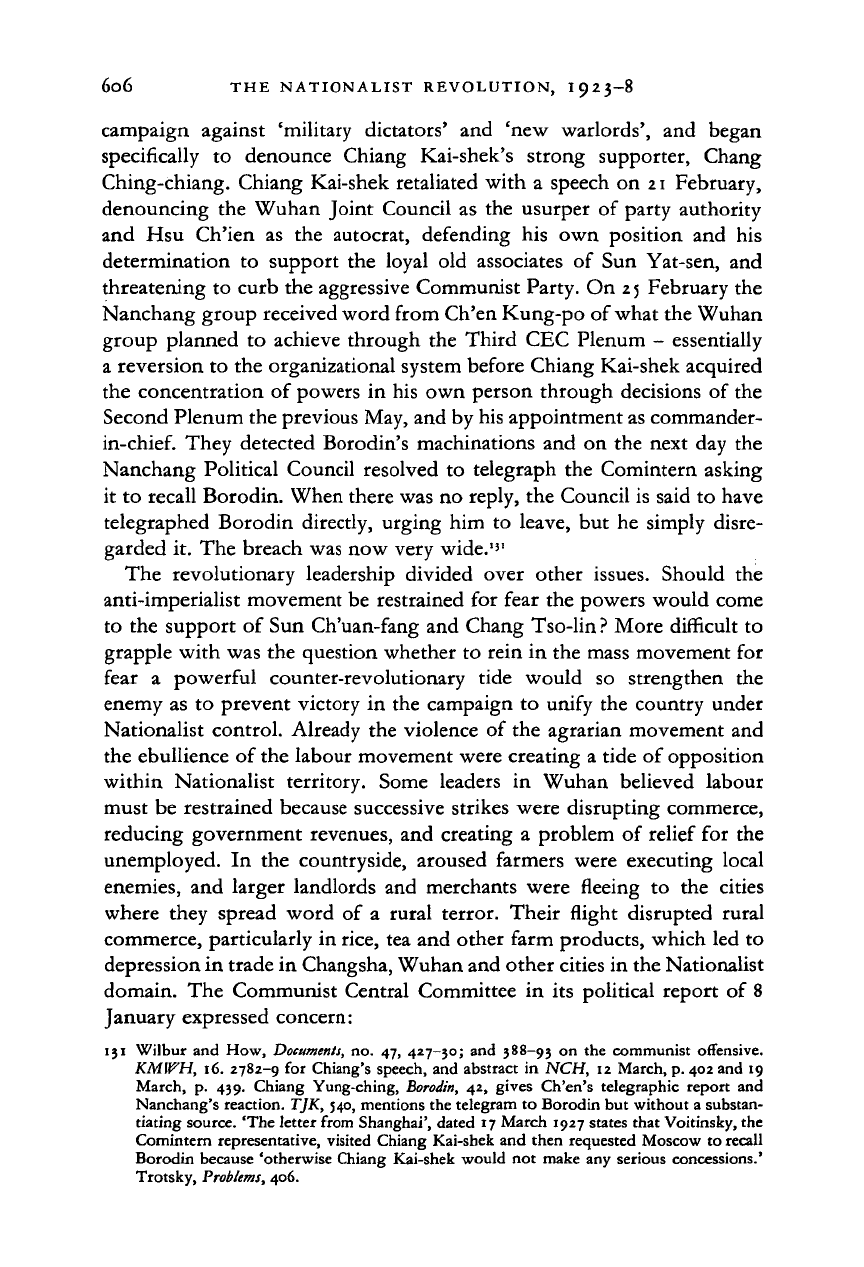
606 THE NATIONALIST REVOLUTION, I 9
2
3-8
campaign against 'military dictators'
and 'new
warlords',
and
began
specifically
to
denounce Chiang Kai-shek's strong supporter, Chang
Ching-chiang. Chiang Kai-shek retaliated with
a
speech
on
21 February,
denouncing
the
Wuhan Joint Council
as the
usurper
of
party authority
and
Hsu
Ch'ien
as the
autocrat, defending
his own
position
and his
determination
to
support
the
loyal
old
associates
of Sun
Yat-sen,
and
threatening
to
curb
the
aggressive Communist Party.
On
2 5
February
the
Nanchang group received word from Ch'en Kung-po
of
what the Wuhan
group planned
to
achieve through
the
Third
CEC
Plenum
-
essentially
a reversion
to the
organizational system before Chiang Kai-shek acquired
the concentration
of
powers
in his own
person through decisions
of the
Second Plenum the previous May, and by his appointment as commander-
in-chief.
They detected Borodin's machinations
and on the
next
day the
Nanchang Political Council resolved
to
telegraph
the
Comintern asking
it
to
recall Borodin. When there was
no
reply,
the
Council
is
said
to
have
telegraphed Borodin directly, urging
him to
leave,
but he
simply disre-
garded
it. The
breach was
now
very wide.
1
'
1
The revolutionary leadership divided over other issues. Should
the
anti-imperialist movement
be
restrained
for
fear
the
powers would come
to
the
support
of
Sun Ch'uan-fang
and
Chang Tso-lin
?
More difficult
to
grapple with was
the
question whether
to
rein
in the
mass movement
for
fear
a
powerful counter-revolutionary tide would
so
strengthen
the
enemy
as to
prevent victory
in the
campaign
to
unify
the
country under
Nationalist control. Already
the
violence
of
the agrarian movement
and
the ebullience
of
the labour movement were creating
a
tide
of
opposition
within Nationalist territory. Some leaders
in
Wuhan believed labour
must
be
restrained because successive strikes were disrupting commerce,
reducing government revenues,
and
creating
a
problem
of
relief
for the
unemployed.
In the
countryside, aroused farmers were executing local
enemies,
and
larger landlords
and
merchants were fleeing
to the
cities
where they spread word
of a
rural terror. Their flight disrupted rural
commerce, particularly
in
rice,
tea and
other farm products, which
led to
depression in trade
in
Changsha, Wuhan and other cities
in
the Nationalist
domain.
The
Communist Central Committee
in its
political report
of 8
January expressed concern:
IJI
Wilbur
and
How,
Documents,
no. 47,
427-30;
and
388-93
on the
communist offensive.
KMWH,
16. 2782-9
for
Chiang's speech,
and
abstract
in NCH, 12
March, p. 402 and
19
March,
p. 439.
Chiang Yung-ching,
Borodin,
42,
gives Ch'en's telegraphic report
and
Nanchang's reaction. TJK, 540, mentions the telegram
to
Borodin
but
without
a
substan-
tiating source. 'The letter from Shanghai', dated 17 March 1927 states that Voitinsky, the
Comintern representative, visited Chiang Kai-shek
and
then requested Moscow to recall
Borodin because 'otherwise Chiang Kai-shek would
not
make
any
serious concessions.'
Trotsky,
Problems,
406.
Cambridge Histories Online © Cambridge University Press, 2008
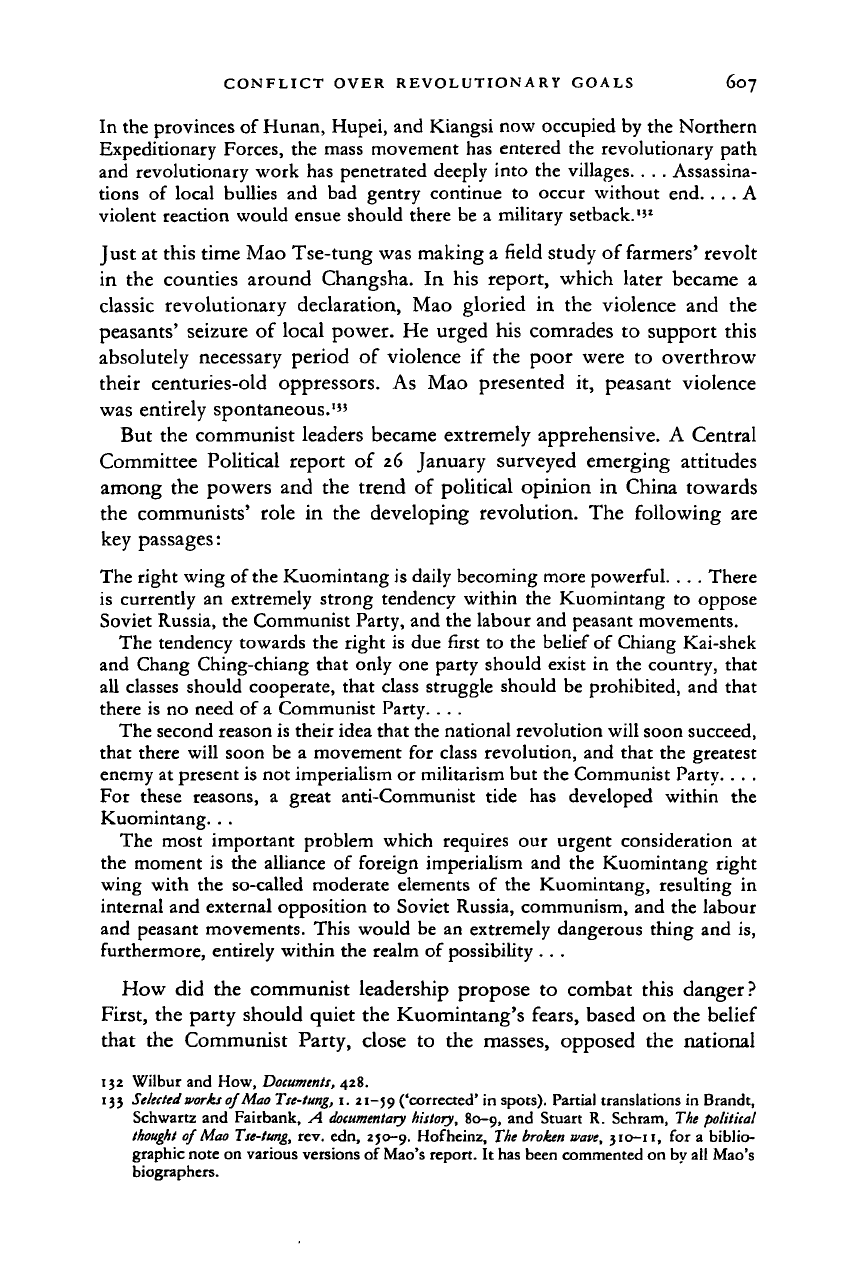
CONFLICT OVER REVOLUTIONARY GOALS 607
In the provinces of Hunan, Hupei, and Kiangsi now occupied by the Northern
Expeditionary Forces, the mass movement has entered the revolutionary path
and revolutionary work has penetrated deeply into the villages. . . . Assassina-
tions of local bullies and bad gentry continue to occur without end. ... A
violent reaction would ensue should there be a military setback.•'•
Just at this time Mao Tse-tung was making a field study of farmers' revolt
in the counties around Changsha. In his report, which later became a
classic revolutionary declaration, Mao gloried in the violence and the
peasants' seizure of local power. He urged his comrades to support this
absolutely necessary period of violence if the poor were to overthrow
their centuries-old oppressors. As Mao presented it, peasant violence
was entirely spontaneous.
1
"
But the communist leaders became extremely apprehensive. A Central
Committee Political report of 26 January surveyed emerging attitudes
among the powers and the trend of political opinion in China towards
the communists' role in the developing revolution. The following are
key passages:
The right wing of
the
Kuomintang is daily becoming more powerful. . . . There
is currently an extremely strong tendency within the Kuomintang to oppose
Soviet Russia, the Communist Party, and the labour and peasant movements.
The tendency towards the right is due first to the belief of Chiang Kai-shek
and Chang Ching-chiang that only one party should exist in the country, that
all classes should cooperate, that class struggle should be prohibited, and that
there is no need of a Communist Party. . . .
The second reason is their idea that the national revolution will soon succeed,
that there will soon be a movement for class revolution, and that the greatest
enemy at present
is
not imperialism or militarism but the Communist Party. . . .
For these reasons, a great anti-Communist tide has developed within the
Kuomintang. . .
The most important problem which requires our urgent consideration at
the moment is the alliance of foreign imperialism and the Kuomintang right
wing with the so-called moderate elements of the Kuomintang, resulting in
internal and external opposition to Soviet Russia, communism, and the labour
and peasant movements. This would be an extremely dangerous thing and is,
furthermore, entirely within the realm of possibility . . .
How did the communist leadership propose to combat this danger?
First, the party should quiet the Kuomintang's fears, based on the belief
that the Communist Party, close to the masses, opposed the national
132 Wilbur and How,
Documents,
428.
133
Selected works
of Mao
Tse-tung,
1. 21-59 ('corrected' in spots). Partial translations in Brandt,
Schwartz and Fairbank, A
documentary
history, 80-9, and Stuart R. Schram, The political
thought
of
Mao
Tse-tung,
rev. edn, 250-9. Hofheinz,
The broken
wave,
310-n, for a biblio-
graphic note on various versions of Mao's report. It has been commented on by all Mao's
biographers.
Cambridge Histories Online © Cambridge University Press, 2008
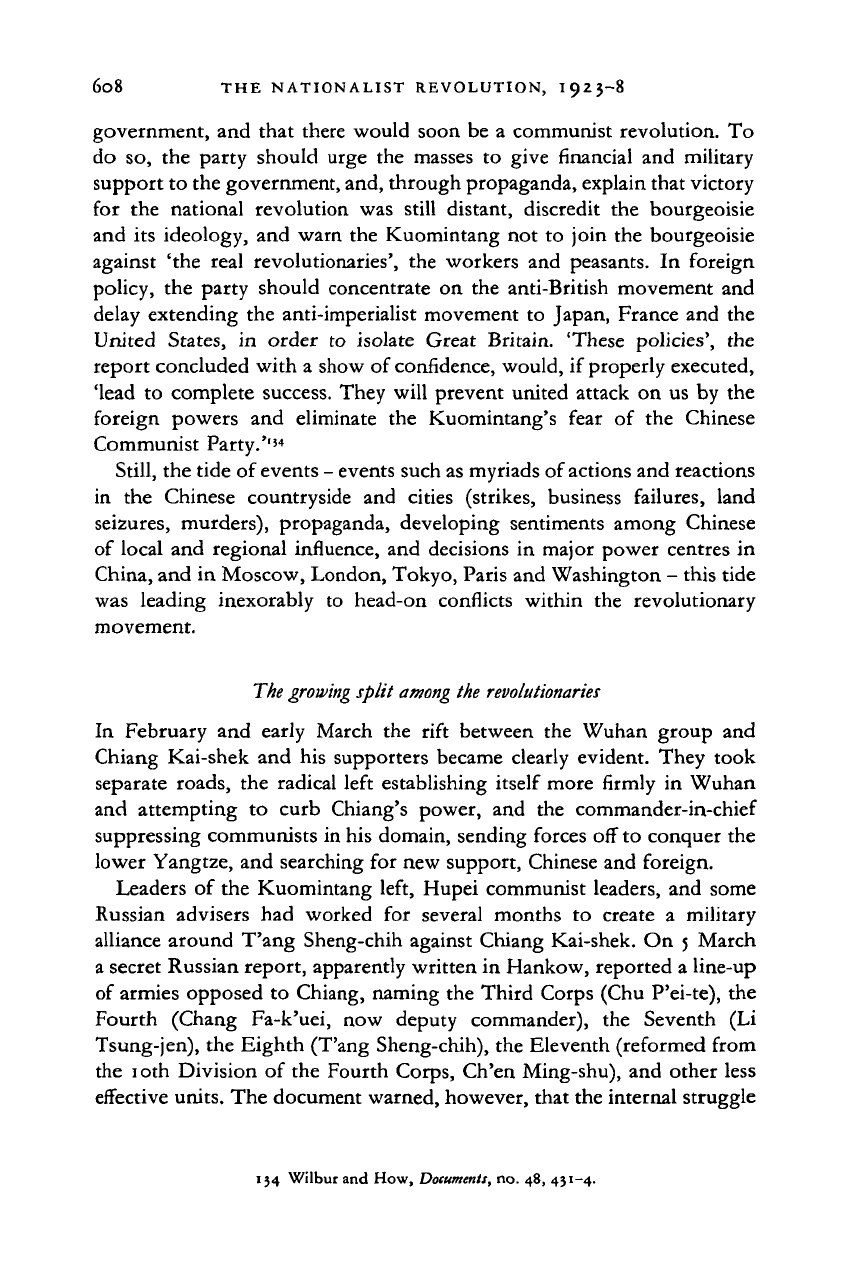
608 THE NATIONALIST REVOLUTION, I 9 2 3-8
government, and that there would soon be a communist revolution. To
do so, the party should urge the masses to give financial and military
support to the government, and, through propaganda, explain that victory
for the national revolution was still distant, discredit the bourgeoisie
and its ideology, and warn the Kuomintang not to join the bourgeoisie
against 'the real revolutionaries', the workers and peasants. In foreign
policy, the party should concentrate on the anti-British movement and
delay extending the anti-imperialist movement to Japan, France and the
United States, in order to isolate Great Britain. 'These policies', the
report concluded with a show of confidence, would, if properly executed,
'lead to complete success. They will prevent united attack on us by the
foreign powers and eliminate the Kuomintang's fear of the Chinese
Communist Party.'
1
'
4
Still, the tide of events - events such as myriads of actions and reactions
in the Chinese countryside and cities (strikes, business failures, land
seizures, murders), propaganda, developing sentiments among Chinese
of local and regional influence, and decisions in major power centres in
China, and in Moscow, London, Tokyo, Paris and Washington - this tide
was leading inexorably to head-on conflicts within the revolutionary
movement.
The
growing
split
among
the
revolutionaries
In February and early March the rift between the Wuhan group and
Chiang Kai-shek and his supporters became clearly evident. They took
separate roads, the radical left establishing itself more firmly in Wuhan
and attempting to curb Chiang's power, and the commander-in-chief
suppressing communists in his domain, sending forces off to conquer the
lower Yangtze, and searching for new support, Chinese and foreign.
Leaders of the Kuomintang left, Hupei communist leaders, and some
Russian advisers had worked for several months to create a military
alliance around T'ang Sheng-chih against Chiang Kai-shek. On
5
March
a secret Russian report, apparently written in Hankow, reported a line-up
of armies opposed to Chiang, naming the Third Corps (Chu P'ei-te), the
Fourth (Chang Fa-k'uei, now deputy commander), the Seventh (Li
Tsung-jen), the Eighth (T'ang Sheng-chih), the Eleventh (reformed from
the
1
oth Division of the Fourth Corps, Ch'en Ming-shu), and other less
effective units. The document warned, however, that the internal struggle
134 Wilbur and How,
Documents,
no. 48, 451-4.
Cambridge Histories Online © Cambridge University Press, 2008
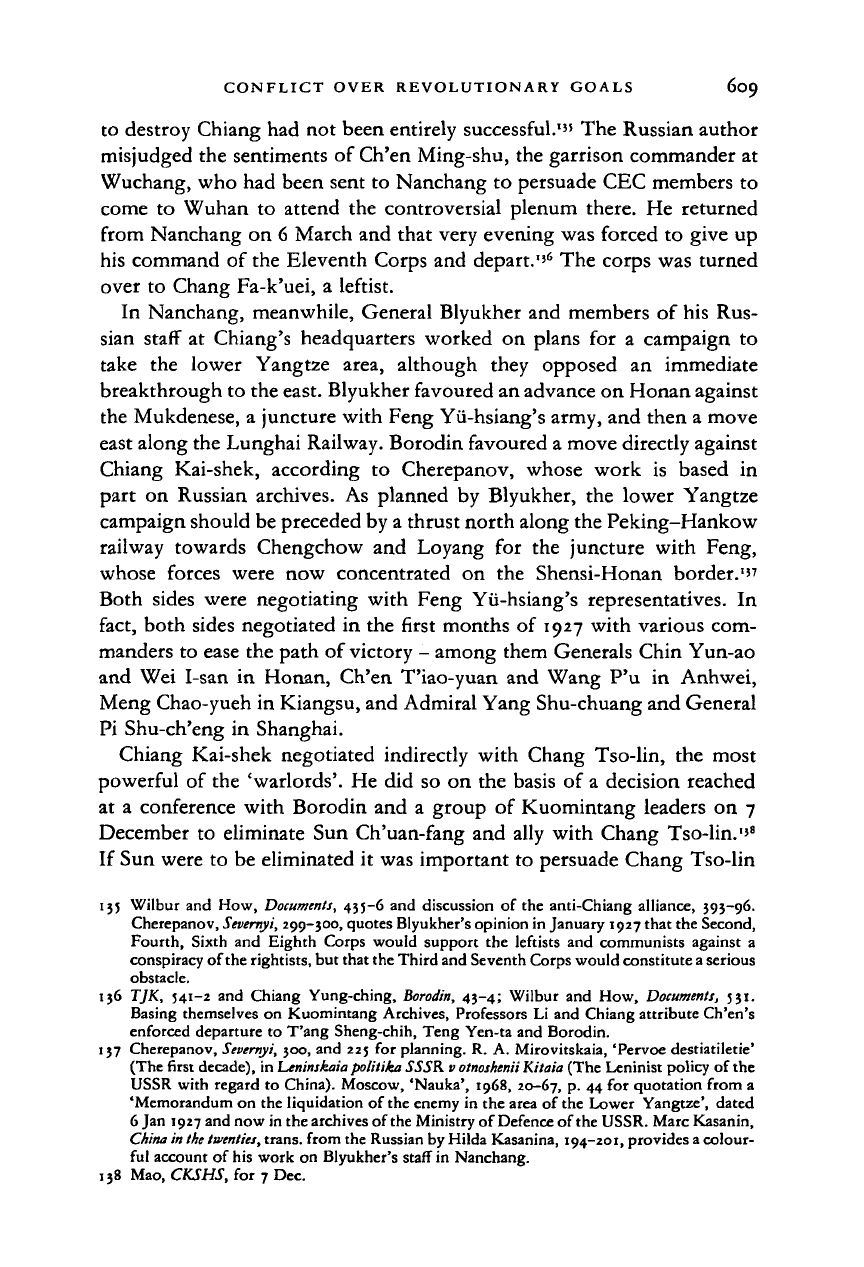
CONFLICT OVER REVOLUTIONARY GOALS 609
to destroy Chiang had not been entirely successful.
1
" The Russian author
misjudged the sentiments of Ch'en Ming-shu, the garrison commander at
Wuchang, who had been sent to Nanchang to persuade CEC members to
come to Wuhan to attend the controversial plenum there. He returned
from Nanchang on 6 March and that very evening was forced to give up
his command of the Eleventh Corps and depart.
1
'
6
The corps was turned
over to Chang Fa-k'uei, a leftist.
In Nanchang, meanwhile, General Blyukher and members of his Rus-
sian staff at Chiang's headquarters worked on plans for a campaign to
take the lower Yangtze area, although they opposed an immediate
breakthrough to the east. Blyukher favoured an advance on Honan against
the Mukdenese, a juncture with Feng Yii-hsiang's army, and then a move
east along the Lunghai Railway. Borodin favoured a move directly against
Chiang Kai-shek, according to Cherepanov, whose work is based in
part on Russian archives. As planned by Blyukher, the lower Yangtze
campaign should be preceded by a thrust north along the Peking-Hankow
railway towards Chengchow and Loyang for the juncture with Feng,
whose forces were now concentrated on the Shensi-Honan border.
1
"
Both sides were negotiating with Feng Yii-hsiang's representatives. In
fact, both sides negotiated in the first months of 1927 with various com-
manders to ease the path of victory - among them Generals Chin Yun-ao
and Wei I-san in Honan, Ch'en T'iao-yuan and Wang P'u in Anhwei,
Meng Chao-yueh in Kiangsu, and Admiral Yang Shu-chuang and General
Pi Shu-ch'eng in Shanghai.
Chiang Kai-shek negotiated indirectly with Chang Tso-lin, the most
powerful of the 'warlords'. He did so on the basis of a decision reached
at a conference with Borodin and a group of Kuomintang leaders on 7
December to eliminate Sun Ch'uan-fang and ally with Chang Tso-lin.
1
'
8
If Sun were to be eliminated it was important to persuade Chang Tso-lin
135 Wilbur and How,
Documents,
435-6 and discussion of the anti-Chiang alliance, 393-96.
Cherepanov,
Severnyi,
299-300, quotes Blyukher's opinion in January 1927 that the Second,
Fourth, Sixth and Eighth Corps would support the leftists and communists against a
conspiracy of the rightists, but that the Third and Seventh Corps would constitute
a
serious
obstacle.
136 TJK, 541-2 and Chiang Yung-ching,
Borodin,
43-4; Wilbur and How, Documents, 531.
Basing themselves on Kuomintang Archives, Professors Li and Chiang attribute Ch'en's
enforced departure to T'ang Sheng-chih, Teng Yen-ta and Borodin.
137 Cherepanov,
Severnyi,
300, and 225 for planning. R. A. Mirovitskaia, 'Pervoe destiatiletie'
(The first decade), in Lcninskaia politika SSSK v
otnoshenii
Kitaia (The Leninist policy of the
USSR with regard to China). Moscow, 'Nauka', 1968, 20-67, P- 44 f°
r
quotation from a
'Memorandum on the liquidation of the enemy in the area of the Lower Yangtze', dated
6 Jan 1927 and now in the archives of the Ministry of Defence of the USSR. Marc Kasanin,
China in the
twenties,
trans, from the Russian by Hilda Kasanina, 194-201, provides a colour-
ful account of his work on Blyukher's staff in Nanchang.
138 Mao, CKSHS, for 7 Dec.
Cambridge Histories Online © Cambridge University Press, 2008
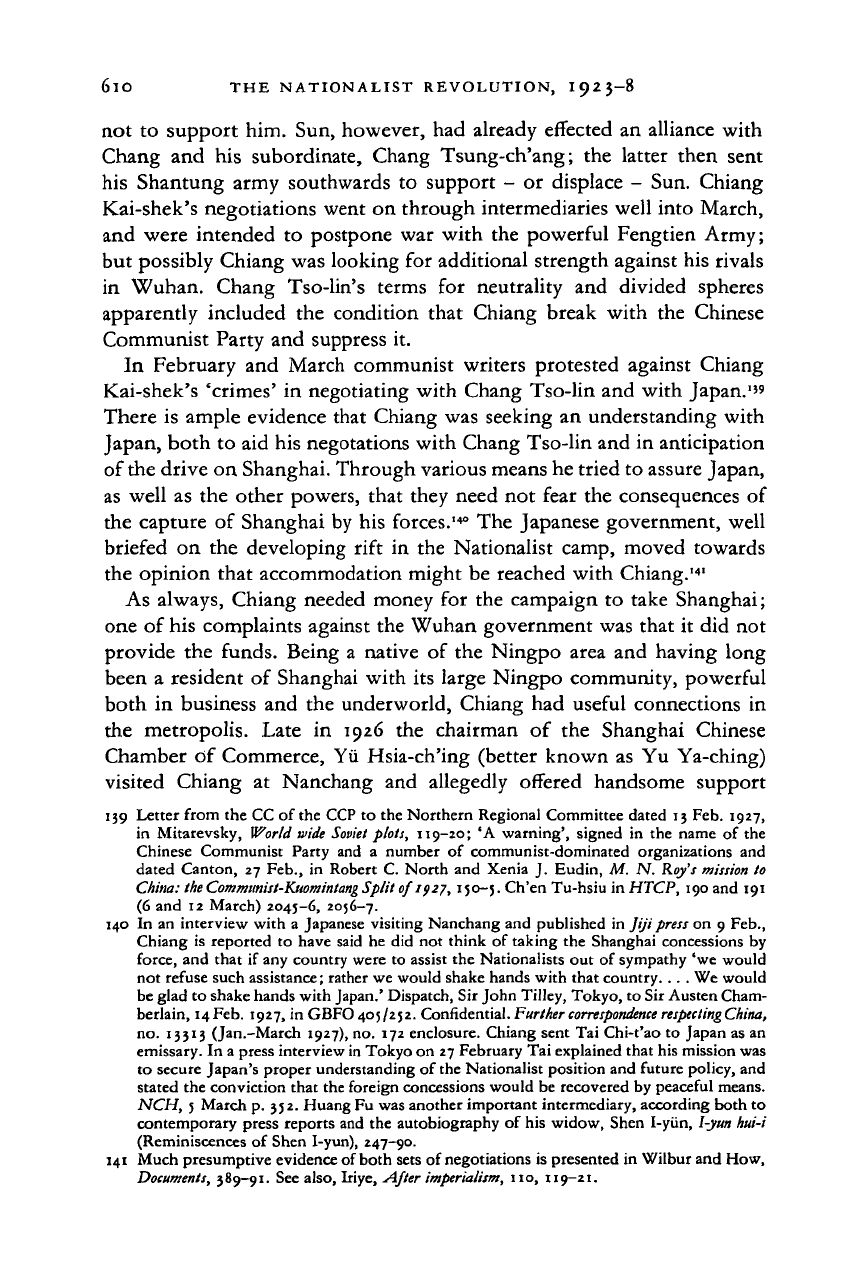
6lO THE NATIONALIST REVOLUTION, I 9
2
3-8
not
to
support him. Sun, however, had already effected an alliance with
Chang
and his
subordinate, Chang Tsung-ch'ang;
the
latter then sent
his Shantung army southwards
to
support
- or
displace
-
Sun. Chiang
Kai-shek's negotiations went on through intermediaries well into March,
and were intended
to
postpone war with the powerful Fengtien Army;
but possibly Chiang was looking for additional strength against his rivals
in Wuhan. Chang Tso-lin's terms
for
neutrality
and
divided spheres
apparently included the condition that Chiang break with
the
Chinese
Communist Party and suppress
it.
In February and March communist writers protested against Chiang
Kai-shek's 'crimes' in negotiating with Chang Tso-lin and with Japan.
1
"
There is ample evidence that Chiang was seeking an understanding with
Japan, both to aid his negotations with Chang Tso-lin and in anticipation
of the drive on Shanghai. Through various means he tried to assure Japan,
as well as the other powers, that they need not fear the consequences of
the capture
of
Shanghai by his forces.
140
The Japanese government, well
briefed
on
the developing rift
in
the Nationalist camp, moved towards
the opinion that accommodation might be reached with Chiang.'
41
As always, Chiang needed money for the campaign to take Shanghai;
one of his complaints against the Wuhan government was that
it
did not
provide the funds. Being
a
native
of
the Ningpo area and having long
been
a
resident
of
Shanghai with its large Ningpo community, powerful
both
in
business and the underworld, Chiang had useful connections
in
the metropolis. Late
in
1926
the
chairman
of
the Shanghai Chinese
Chamber
of
Commerce, Yii Hsia-ch'ing (better known as Yu Ya-ching)
visited Chiang
at
Nanchang
and
allegedly offered handsome support
139 Letter from the CC
of
the CCP
to
the Northern Regional Committee dated 13 Feb. 1927,
in Mitarevsky, World wide
Soviet
plots, 119-20;
'A
warning', signed
in
the name
of
the
Chinese Communist Party
and a
number
of
communist-dominated organizations
and
dated Canton, 27 Feb.,
in
Robert
C.
North and Xenia
J.
Eudin,
M. N.
Roy's mission
to
China:theCommunist-KuomintangSplitofif2y, 150-5. Ch'en Tu-hsiu in HTCP, 190 and 191
(6 and 12 March) 2045-6, 2056-7.
140
In an
interview with
a
Japanese visiting Nanchang and published in Jiji press on
9
Feb.,
Chiang
is
reported
to
have said
he
did not think
of
taking the Shanghai concessions
by
force, and that
if
any country were
to
assist the Nationalists out
of
sympathy 'we would
not refuse such assistance; rather we would shake hands with that country.
. . .
We would
be glad to shake hands with Japan.' Dispatch, Sir John Tilley, Tokyo, to Sir Austen Cham-
berlain,
14
Feb. 1927, in GBFO 405/252. Confidential. Further
correspondence respecting
China,
no.
13315 (Jan.-March 1927), no. 172 enclosure. Chiang sent Tai Chi-t'ao
to
Japan as an
emissary. In
a
press interview in Tokyo on 27 February Tai explained that his mission was
to secure Japan's proper understanding
of
the Nationalist position and future policy, and
stated the conviction that the foreign concessions would be recovered by peaceful means.
NCH, 5 March p. 352. Huang Fu was another important intermediary, according both
to
contemporary press reports and the autobiography
of
his widow, Shen I-yiin, l-yun hui-i
(Reminiscences
of
Shen I-yun), 247-90.
141 Much presumptive evidence of both sets of negotiations is presented in Wilbur and How,
Documents,
389-91.
See also, Iriye, After imperialism, no,
n9-21.
Cambridge Histories Online © Cambridge University Press, 2008
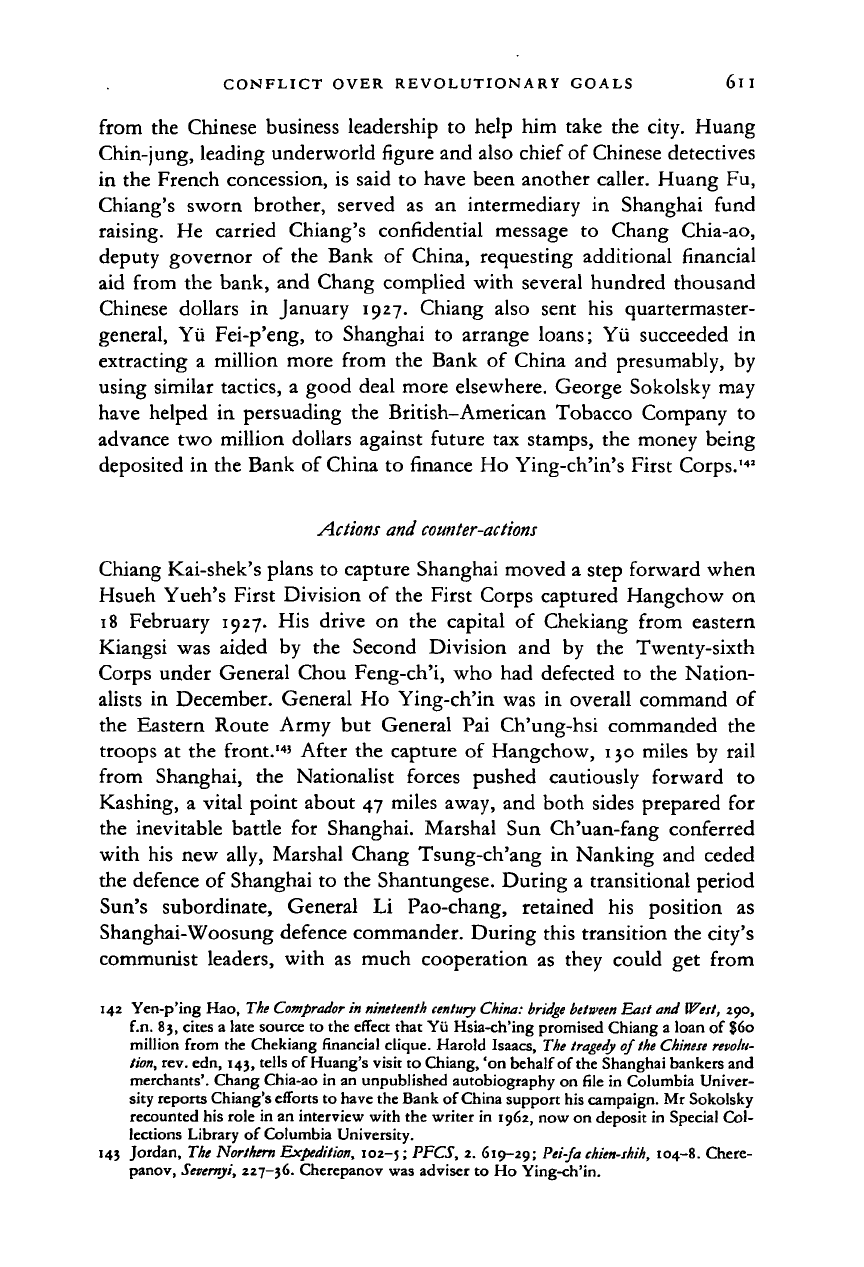
CONFLICT OVER REVOLUTIONARY GOALS 6l I
from the Chinese business leadership to help him take the city. Huang
Chin-jung, leading underworld figure and also chief of Chinese detectives
in the French concession, is said to have been another caller. Huang Fu,
Chiang's sworn brother, served as an intermediary in Shanghai fund
raising. He carried Chiang's confidential message to Chang Chia-ao,
deputy governor of the Bank of China, requesting additional financial
aid from the bank, and Chang complied with several hundred thousand
Chinese dollars in January 1927. Chiang also sent his quartermaster-
general, Yii Fei-p'eng, to Shanghai to arrange loans; Yu succeeded in
extracting a million more from the Bank of China and presumably, by
using similar tactics, a good deal more elsewhere. George Sokolsky may
have helped in persuading the British-American Tobacco Company to
advance two million dollars against future tax stamps, the money being
deposited in the Bank of China to finance Ho Ying-ch'in's First Corps.
142
Actions and
counter-actions
Chiang Kai-shek's plans to capture Shanghai moved a step forward when
Hsueh Yueh's First Division of the First Corps captured Hangchow on
18 February 1927. His drive on the capital of Chekiang from eastern
Kiangsi was aided by the Second Division and by the Twenty-sixth
Corps under General Chou Feng-ch'i, who had defected to the Nation-
alists in December. General Ho Ying-ch'in was in overall command of
the Eastern Route Army but General Pai Ch'ung-hsi commanded the
troops at the front.
14
' After the capture of Hangchow, 130 miles by rail
from Shanghai, the Nationalist forces pushed cautiously forward to
Kashing, a vital point about 47 miles away, and both sides prepared for
the inevitable battle for Shanghai. Marshal Sun Ch'uan-fang conferred
with his new ally, Marshal Chang Tsung-ch'ang in Nanking and ceded
the defence of Shanghai to the Shantungese. During a transitional period
Sun's subordinate, General Li Pao-chang, retained his position as
Shanghai-Woosung defence commander. During this transition the city's
communist leaders, with as much cooperation as they could get from
142 Yen-p'ing Hao,
The Comprador
in
nineteenth century
China:
bridge between
East and West, 290,
f.n. 83, cites a late source to the effect that Yii Hsia-ch'ing promised Chiang a loan of ?6o
million from the Chekiang financial clique. Harold Isaacs,
The tragedy
of
the Chinese
revolu-
tion,
rev. edn, 14}, tells of Huang's visit to Chiang, 'on behalf of the Shanghai bankers and
merchants'. Chang Chia-ao in an unpublished autobiography on file in Columbia Univer-
sity reports Chiang's efforts to have the Bank of China support his campaign. Mr Sokolsky
recounted his role in an interview with the writer in 1962, now on deposit in Special Col-
lections Library of Columbia University.
143 Jordan,
The
Northern Expedition, 102-5; PFCS, 2. 619-29; Pei-fa
chien-shih,
104-8. Chere-
panov,
Sevcrnyi,
227-36. Cherepanov was adviser to Ho Ying-ch'in.
Cambridge Histories Online © Cambridge University Press, 2008
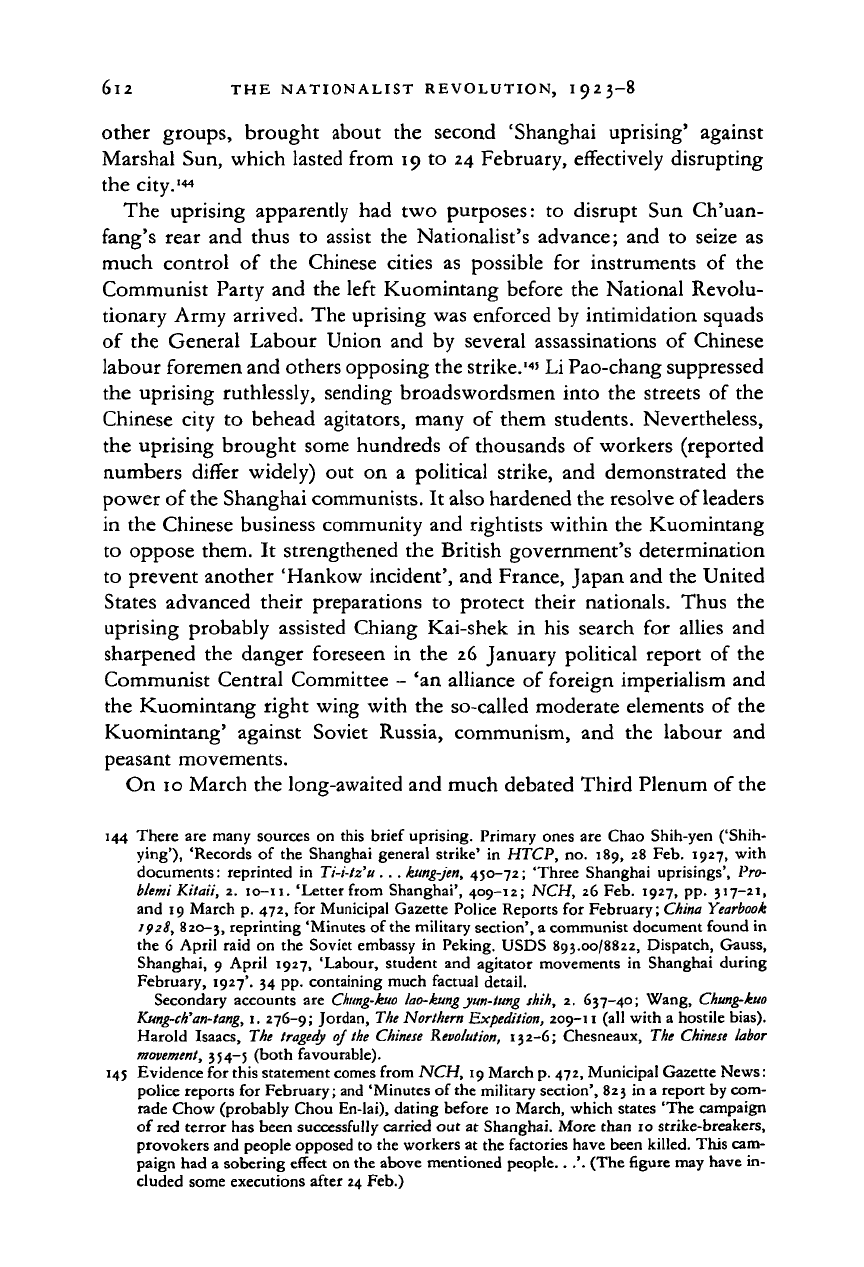
6l2 THE NATIONALIST REVOLUTION, 1923-8
other groups, brought about
the
second 'Shanghai uprising' against
Marshal
Sun,
which lasted from
19 to 24
February, effectively disrupting
the city.
144
The uprising apparently
had two
purposes:
to
disrupt
Sun
Ch'uan-
fang's rear
and
thus
to
assist
the
Nationalist's advance;
and
to
seize
as
much control
of
the
Chinese cities
as
possible
for
instruments
of
the
Communist Party
and the
left Kuomintang before
the
National Revolu-
tionary Army arrived.
The
uprising
was
enforced
by
intimidation squads
of
the
General Labour Union
and by
several assassinations
of
Chinese
labour foremen and others opposing the strike.'
4
' Li Pao-chang suppressed
the uprising ruthlessly, sending broadswordsmen into
the
streets
of
the
Chinese city
to
behead agitators, many
of
them students. Nevertheless,
the uprising brought some hundreds
of
thousands
of
workers (reported
numbers differ widely)
out
on a
political strike,
and
demonstrated
the
power
of
the Shanghai communists.
It
also hardened the resolve
of
leaders
in
the
Chinese business community
and
rightists within
the
Kuomintang
to oppose them.
It
strengthened
the
British government's determination
to prevent another 'Hankow incident',
and
France, Japan
and the
United
States advanced their preparations
to
protect their nationals. Thus
the
uprising probably assisted Chiang Kai-shek
in
his
search
for
allies
and
sharpened
the
danger foreseen
in
the 26
January political report
of
the
Communist Central Committee
-
'an
alliance
of
foreign imperialism
and
the Kuomintang right wing with
the
so-called moderate elements
of the
Kuomintang' against Soviet Russia, communism,
and
the
labour
and
peasant movements.
On 10 March
the
long-awaited
and
much debated Third Plenum
of
the
144 There are many sources
on
this brief uprising. Primary ones are Chao Shih-yen ('Shih-
ying'),
'Records
of
the Shanghai general strike'
in
HTCP, no. 189,
28
Feb. 1927, with
documents: reprinted
in
Ti-i-tz'u.
.
.
kung-jen,
450-72; 'Three Shanghai uprisings', Pro-
blemi
Kitaii,
2.
10-n. 'Letter from Shanghai', 409-12;
NCH,
26 Feb. 1927, pp.
317-21,
and 19 March p. 472,
for
Municipal Gazette Police Reports
for
February;
China Yearbook
192S,
820-5,
reprinting 'Minutes of the military section',
a
communist document found
in
the
6
April raid
on the
Soviet embassy
in
Peking. USDS 893.00/8822, Dispatch, Gauss,
Shanghai,
9
April 1927, 'Labour, student
and
agitator movements
in
Shanghai during
February, 1927'. 34 pp. containing much factual detail.
Secondary accounts
are
Chung-kuo
lao-kung
yun-tung shih,
2.
637-40; Wang, Chung-kuo
Kung-ch'an-tang,
i.
276-9; Jordan, The Northern Expedition, 209-11
(all
with
a
hostile bias).
Harold Isaacs,
The
tragedy
of
the Chinese Revolution,
13
2-6; Chesneaux,
The
Chinese labor
movement, 354-5 (both favourable).
145 Evidence
for
this statement comes from
NCH, 19
March
p.
472, Municipal Gazette News:
police reports
for
February;
and
'Minutes
of the
military section',
823 in a
report
by com-
rade Chow (probably Chou En-lai), dating before
10
March, which states
'The
campaign
of
red
terror
has
been successfully carried
out at
Shanghai. More than
10
strike-breakers,
provokers
and
people opposed
to the
workers
at the
factories have been killed. This
cam-
paign
had
a
sobering effect
on the
above mentioned people..
.'. (The
figure
may
have
in-
cluded some executions after
24 Feb.)
Cambridge Histories Online © Cambridge University Press, 2008
